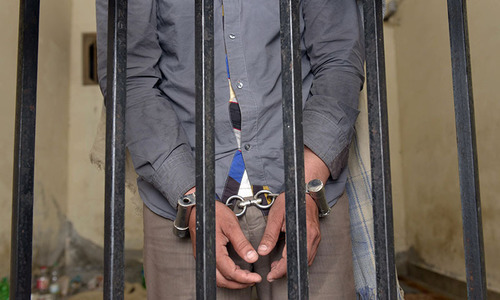An art installation, titled 'Lost/Un-found', was inaugurated on Wednesday at the Fatima Jinnah Park in Islamabad, commemorating the International Migrants Day observed every year on December 18.
Present at the event were families of the Pakistani migrant workers imprisoned abroad as well as Senator Seemi Ezdi.
A project of the Justice Project Pakistan (JPP), the art installation was conceived and developed by artist and storyteller Fahad Naveed and highlights the plight of nearly 11,000 Pakistanis imprisoned in foreign jails, including around 3,000 in Saudi Arabia alone.
It aims to underline Pakistan’s weak regulation of labour migration leaving thousands of mostly low-wage Pakistani workers vulnerable to human trafficking, forced labour, ill-treatment in detention overseas, and even the risk of death.
At the event, the 11,000 Pakistani labourers imprisoned abroad were represented by 1,100 suitcases placed in an open public space and from within those suitcases emerged incoherent, jumbled sounds — stories of families waiting for the return of their loved ones, and of prisoners narrating their ordeal and the circumstances of their arrest and detention.
Several stories played simultaneously, creating a distressing and unnerving ambiance.
Take a look: Broken lives
“This installation is an attempt to raise questions about the thousands of migrant workers in jails around the world,” said artist Naveed, a graduate of news and documentary filmmaking from New York University. “By placing 1,100 suitcases — a fraction of the number of prisoners — in the open spaces of a park, I hope to get visitors to pause and think about those who are locked up, and do not enjoy these freedoms.”
The families of those imprisoned abroad appealed to the government to ensure their loved ones were brought back and consular protection provided to them. Senator Seemi Ezdi heard the plight of the families and assured them that the government was committed to providing relief to the inmates.
Talking to Dawn, Wakeel Khan, whose son is imprisoned in Saudi Arabia, said many of the workers who travelled for work and were imprisoned for minor crimes were languishing in jails.
“Their parents, wives and children here in Pakistan are disturbed and living a difficult life. Their wives have to work in houses; their children cannot go to school,” he lamented.
Similarly, Lahore’s Muhammad Naveed told Dawn that his mother was being treated poorly in a Saudi jail.
“I appeal to the government to help me bring back my mother who is totally innocent. I want to appeal on behalf of all the other prisoners also that they should be supported in their ordeal. I urge the Saudi government to support the inmates. We appeal to the prime minister because we have a lot of hope from him. He even promised the return of foreign prisoners, so we urge him to fulfil the promise now.”
Read | 11,000 Pakistanis suffering in foreign jails: JPP study
Senator Ezdi, while talking to Dawn, said: “The intending migrant workers must have valid documents, such as invitation letters, from their prospective workplace. They must also know the basic language of the country they intend to travel to because they work with the local population.”
She further claimed that Islamabad has had over 200 Pakistani inmates returned from abroad in a year. In the last 15 months, she added, 4,500 cases were disposed of and those inmates would return soon.

According to JPP, many of those imprisoned abroad were indigent labourers who travelled for job opportunities and were forced by their handlers into carrying drugs. Others were victims of human trafficking or travelling on forged documents provided by dubious overseas employment agents.
They are then at the mercy of local courts without access to lawyers, impartial translators, or consular assistance from Pakistani diplomatic missions. Resultantly, they face the harshest punishments due to their lack of understanding of and assistance with the legal process, incapability to communicate directly with the court, and inability to produce evidence from Pakistan in their defence.
Sarah Belal, executive director of JPP, adds: “There is a power in art to move the coldest of hearts. We have brought this installation to the people of Islamabad for them to understand the horrors migrants face in prisons abroad and what their families go through back home. The government must wake up to this nightmare and do all in its power to ensure these indigent prisoners are not deprived of their fundamental human rights as guaranteed under the Constitution of Pakistan.”
Earlier in February, Saudi Crown Prince Muhammad bin Salman, during a welcome ceremony on his visit to Pakistan, had promised to do “whatever we can” after Prime Minister Imran Khan had made a "special request" to look into the hardships of Pakistani labourers working in Saudi Arabia.
"There are some 3,000 [Pakistani] prisoners there and we just would like you to bear in mind that they are poor people who have left their families behind," the premier had said.
A day after the pronouncement, federal minister Fawad Chaudhry had tweeted that MBS had “ordered the immediate release of 2,107 Pakistani prisoners from Saudi Jails”, with Foreign Minister Shah Mahmood Qureshi also tweeting about the release of Pakistani prisoners "with immediate effect", adding that "cases of the remaining will be reviewed".















































